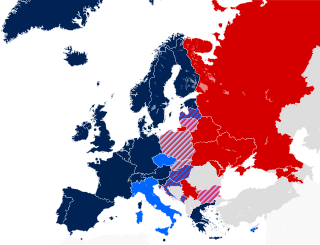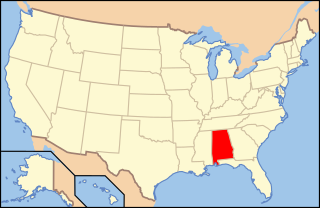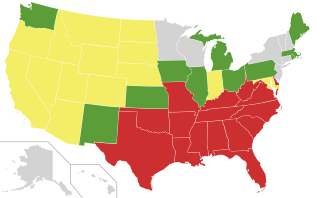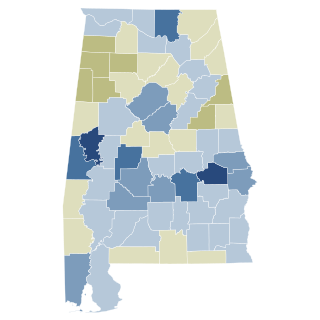The Federal Marriage Amendment (FMA), also referred to by proponents as the Marriage Protection Amendment, was a proposed amendment to the United States Constitution that would legally define marriage as a union of one man and one woman. The FMA would also prevent judicial extension of marriage rights to same-sex (gay) or other unmarried homosexual couples.

The availability of legally recognized same-sex marriage in the United States expanded from one state (Massachusetts) in 2004 to all fifty states in 2015 through various court rulings, state legislation, and direct popular votes. States each have separate marriage laws, which must adhere to rulings by the Supreme Court of the United States that recognize marriage as a fundamental right guaranteed by both the Due Process Clause and the Equal Protection Clause of the Fourteenth Amendment to the United States Constitution, as first established in the 1967 landmark civil rights case of Loving v. Virginia.
Loving v. Virginia, 388 U.S. 1 (1967), was a landmark civil rights decision of the U.S. Supreme Court in which the Court ruled that laws banning interracial marriage violate the Equal Protection and Due Process Clauses of the Fourteenth Amendment to the U.S. Constitution. The case involved Mildred Loving, a woman of color, and white man Richard Loving. In 1958, they were sentenced to a year in prison for marrying each other. Their marriage violated Virginia's Racial Integrity Act of 1924, which criminalized marriage between people classified as "white" and people classified as "colored". The Lovings appealed their conviction to the Supreme Court of Virginia, which upheld it. They then appealed to the U.S. Supreme Court, which agreed to hear their case.

Prior to the Supreme Court's decision in Obergefell v. Hodges (2015), U.S. state constitutional amendments banning same-sex unions of several different types passed, banning legal recognition of same-sex unions in U.S. state constitutions, referred to by proponents as "defense of marriage amendments" or "marriage protection amendments." These state amendments are different from the proposed Federal Marriage Amendment, which would ban same-sex marriage in every U.S. state, and Section 2 of the Defense of Marriage Act, more commonly known as DOMA, which allowed the states not to recognize same-sex marriages from other states. The amendments define marriage as a union between one man and one woman and prevent civil unions or same-sex marriages from being legalized, though some of the amendments bar only the latter. The Obergefell decision in June 2015 invalidated these state constitutional amendments insofar as they prevented same-sex couples from marrying, even though the actual text of these amendments remain written into the state constitutions.
This is a list of notable events in the history of LGBT rights that took place in the year 2005.
Same-sex marriage has been legally recognized in New Jersey since October 21, 2013, the effective date of a trial court ruling invalidating the state's restriction of marriage to persons of different sexes. In September 2013, Mary C. Jacobson, Assignment Judge of the Mercer Vicinage of the Superior Court, ruled that as a result of the U.S. Supreme Court's June 2013 decision in United States v. Windsor, the Constitution of New Jersey requires the state to recognize same-sex marriages. The Windsor decision held that the federal government was required to provide the same benefits to same-sex couples who were married under state law as to other married couples. Therefore, the state court reasoned in Garden State Equality v. Dow that, because same-sex couples in New Jersey were limited to civil unions, which are not recognized as marriages under federal law, the state must permit civil marriage for same-sex couples. This ruling, in turn, relied on the 2006 decision of the New Jersey Supreme Court in Lewis v. Harris that the state was constitutionally required to afford the rights and benefits of marriage to same-sex couples. The Supreme Court had ordered the New Jersey Legislature to correct the constitutional violation, by permitting either same-sex marriage or civil unions with all the rights and benefits of marriage, within 180 days. In response, the Legislature passed a bill to legalize civil unions on December 21, 2006, which became effective on February 19, 2007.
In April and May 2007, following a previous attempt in 2005, the Oregon state legislature passed legislation to make virtually all of the rights afforded by the state to married couples available to same-sex couples. The status is referred to in Oregon law as a domestic partnership, avoiding the use of the terms marriage or civil union. Governor Ted Kulongoski signed the bill on May 9, 2007. While January 1, 2008 was the date the statute would have taken effect, a court challenge had delayed its implementation. It was resolved on February 1, 2008, and the law went into effect that day, with registrations beginning on February 4, 2008.

Lesbian, gay, bisexual, and transgender (LGBT) rights in the Republic of Ireland are among the most advanced in Europe. Ireland is notable for its transformation from a country holding overwhelmingly conservative attitudes toward LGBT issues, in part due to the opposition by the Roman Catholic Church, to one holding overwhelmingly liberal views in the space of a generation. In May 2015, Ireland became the first country to legalise same-sex marriage on a national level by popular vote. The New York Times declared that the result put Ireland at the "vanguard of social change". Since July 2015, transgender people in Ireland can self-declare their gender for the purpose of updating passports, driving licences, obtaining new birth certificates, and getting married. Both male and female same-sex sexual activity have been legal in the state since 1993. Government recognition of LGBT rights in Ireland has expanded greatly over the past two decades. Homosexuality was decriminalised in 1993, and most forms of discrimination based on sexual orientation are now outlawed. Ireland also forbids incitement to hatred based on sexual orientation.
This is a list of notable events in the history of LGBT rights that took place in the year 2006.

Lesbian, gay, bisexual, and transgender (LGBT) rights are widely diverse in Europe per country. Twenty of the 35 countries that have legalised same-sex marriage worldwide are situated in Europe. A further eleven European countries have legalised civil unions or other forms of more limited recognition for same-sex couples.

Proposition 2 was a referendum for a state constitutional amendment placed on the ballot by the Texas legislature and approved by the voters at the November 8, 2005 general election. The measure added a new provision to the Texas Constitution, Article 1, Section 32, which provides that "Marriage in this state shall consist only of the union of one man and one woman", and "This state or a political subdivision of this state may not create or recognize any legal status identical or similar to marriage." Texas thus became the nineteenth US state to adopt constitutional amendment banning same-sex marriage. It was the most populous state to adopt a constitutional ban on same-sex marriage until California passed its ban in November 2008.

Nebraska Initiative 416 was a 2000 ballot initiative that amended the Nebraska Constitution to make it unconstitutional for the state to recognize or perform same-sex marriage, same-sex civil unions or domestic partnerships. The referendum was approved on November 7, 2000, by 70% of the voters. The initiative has since been struck down in federal court and same-sex marriage is now legally recognized in the state of Nebraska.

The Amendment 774 of 2006, also known as Alabama Sanctity of Marriage Amendment, is an amendment to the Alabama Constitution that makes it unconstitutional for the state to recognize or perform same-sex marriages or civil unions. The legislature passed Alabama Act 2005-35, which placed this amendment on the election ballot. The referendum was approved by 81% of the voters.

Lesbian, gay, bisexual, and transgender (LGBT) individuals in the U.S. state of Alabama have federal protections, but still face legal challenges and discrimination on the state level that is not experienced by non-LGBT residents. LGBT rights in Alabama—a Republican Party stronghold located in both the Deep South and greater Bible Belt—are severely limited in comparison to other states. As one of the most socially conservative states in the U.S., Alabama is one of the only two states along with neighboring Mississippi where opposition to same-sex marriage outnumbers support.

The Respect for Marriage Act is a landmark United States federal law passed by the 117th United States Congress and signed into law by President Joe Biden. It repeals the Defense of Marriage Act (DOMA), requires the U.S. federal government and all U.S. states and territories to recognize the validity of same-sex and interracial civil marriages in the United States, and protects religious liberty. Its first version in 2009 was supported by former Republican U.S. Representative Bob Barr, the original sponsor of DOMA, and former President Bill Clinton, who signed DOMA in 1996. Iterations of the proposal were put forth in the 111th, 112th, 113th, 114th, and 117th Congresses.

In the United States, anti-miscegenation laws were passed by most states to prohibit interracial marriage, and in some cases also prohibit interracial sexual relations. Some such laws predate the establishment of the United States, some dating to the later 17th or early 18th century, a century or more after the complete racialization of slavery. Nine states never enacted such laws; 25 states had repealed their laws by 1967, when the United States Supreme Court ruled in Loving v. Virginia that such laws were unconstitutional in the remaining 16 states. The term miscegenation was first used in 1863, during the American Civil War, by journalists to discredit the abolitionist movement by stirring up debate over the prospect of interracial marriage after the abolition of slavery.
This article contains a timeline of significant events regarding same-sex marriage in the United States. On June 26, 2015, the landmark US Supreme Court decision in Obergefell v. Hodges effectively ended restrictions on same-sex marriage in the United States.
In the United States, the history of same-sex marriage dates from the early 1940s, when the first lawsuits seeking legal recognition of same-sex relationships brought the question of civil marriage rights and benefits for same-sex couples to public attention though they proved unsuccessful. However marriage wasn't a request for the LGBTQ movement until the Second National March on Washington for Lesbian and Gay Rights in Washington (1987). The subject became increasingly prominent in U.S. politics following the 1993 Hawaii Supreme Court decision in Baehr v. Miike that suggested the possibility that the state's prohibition might be unconstitutional. That decision was met by actions at both the federal and state level to restrict marriage to male-female couples, notably the enactment at the federal level of the Defense of Marriage Act.

2000 Alabama Amendment 2, also known as the Alabama Interracial Marriage Amendment, was a proposed amendment to the Constitution of Alabama to remove Alabama's ban on interracial marriage. Interracial marriage had already been legalized nationwide 33 years prior in 1967, following Loving v. Virginia, making the vote symbolic. The amendment was approved with 59.5% voting yes, a 19 percentage point margin, though 25 of Alabama's 67 counties voted against it. Alabama was the last state to officially repeal its anti-miscegenation laws, following South Carolina in 1998.

A referendum was held on 25 September 2022 in Cuba to approve amendments to the Family Code of the Cuban Constitution. The referendum passed, greatly strengthening gender equality, legalizing same-sex marriage, same-sex adoption, and altruistic surrogacy, and affirming a wide range of rights and protections for women, children, the elderly and people with disabilities. Following the referendum, Cuba's family policies have been described as among the most progressive in Latin America.












